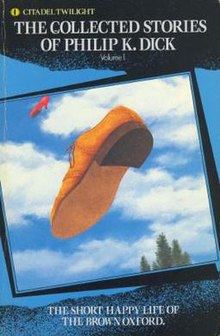"Breakfast at Twilight" is a science fiction short story by American writer Philip K. Dick. It was received by the Scott Meredith Literary Agency on January 17, 1953 and first published in Amazing Stories, July 1954. It appears in the second volume reprint of Philip K. Dick's short stories Second Variety.
"Roog" is a science fiction short story by American writer Philip K. Dick. It was his first sold work, although not his first published story.
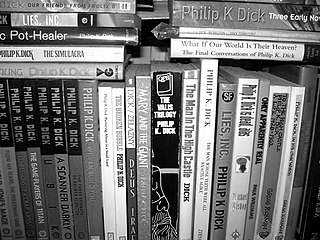
The bibliography of Philip K. Dick includes 44 novels, 121 short stories, and 14 short story collections published by American science fiction author Philip K. Dick during his lifetime.
"Expendable" is a science fiction short story by American writer Philip K. Dick. It was first published in The Magazine of Fantasy and Science Fiction issue of July 1953. The plot centers on an unnamed human being caught in the middle of the ongoing, million year conflict between the degenerate descendants of the insects and humans.

The Best of Philip K. Dick is a collection of science fiction stories by American writer Philip K. Dick. It was first published by Del Rey Books in 1977 as a volume in its Classic Library of Science Fiction. Many of the stories had originally appeared in the magazines Planet Stories, Fantasy and Science Fiction, Space Science Fiction, Imagination, Astounding Stories, Galaxy Science Fiction, Amazing Stories, Science Fiction Stories and Startling Stories, as well as the anthologies Dangerous Visions and Star Science Fiction Stories No.3.
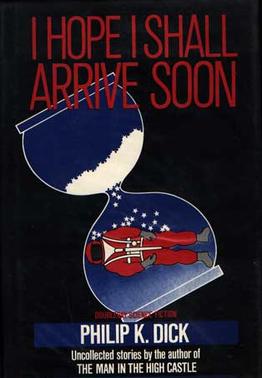
I Hope I Shall Arrive Soon is a book by American writer Philip K. Dick, a collection of 10 science fiction short stories and one essay. It was first published by Doubleday in 1985 and was edited by Mark Hurst and Paul Williams. Many of the stories had originally appeared in the magazines Fantasy and Science Fiction, Worlds of Tomorrow, Amazing Stories, Interzone, Rolling Stone College Papers, The Yuba City High Times, Omni and Playboy.

The Collected Stories of Philip K. Dick is a collection of 118 science fiction stories by American writer Philip K. Dick. It was first published by Underwood-Miller in 1987 as a five volume set. See Philip K. Dick bibliography for information about the mass market reprints.
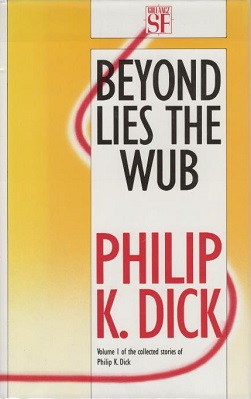
Beyond Lies the Wub is a collection of science fiction stories by American writer Philip K. Dick. It was first published by Gollancz in 1988 and later comprised Volume I of The Collected Stories of Philip K. Dick. Many of the stories had originally appeared in the magazines Fantasy and Science Fiction, Planet Stories, If, Galaxy Science Fiction, Imagination, Space Science Fiction, Fantastic Story Magazine, Amazing Stories, Future, Cosmos, Fantasy Fiction, Beyond Fantasy Fiction, Thrilling Wonder Stories, Startling Stories. The collection was reprinted by Citadel Press in 2003 under the title Paycheck and Other Classic Stories.
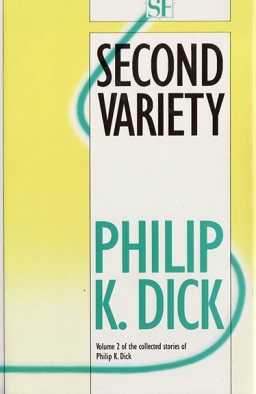
Second Variety is a collection of science fiction stories by American writer Philip K. Dick. It was first published by Gollancz in 1989 and reprints Volume II of The Collected Stories of Philip K. Dick. It had not previously been published as a stand-alone volume. Many of the stories had originally appeared in the magazines Fantasy Fiction, Fantastic Universe, Space Science Fiction, Imagination, If, Amazing Stories, Science Fiction Quarterly, Startling Stories, Cosmos, Orbit, Astounding and Planet Stories. The 1990 Citadel collection We Can Remember It for You Wholesale is identical except that it has "We Can Remember It for You Wholesale" instead of "Second Variety".
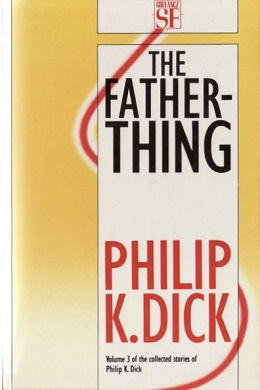
The Father-Thing is a collection of science fiction stories by American writer Philip K. Dick. It was first published by Gollancz in 1989 and reprints Volume III of The Collected Stories of Philip K. Dick. It had not previously been published as a stand-alone volume. Many of the stories had originally appeared in the magazines If, Science Fiction Adventures, Science Fiction Stories, Orbit, Fantasy and Science Fiction, Imagination, Future, Galaxy Science Fiction, Beyond Fantasy Fiction, Satellite, Science Fiction Quarterly and Imaginative Tales.
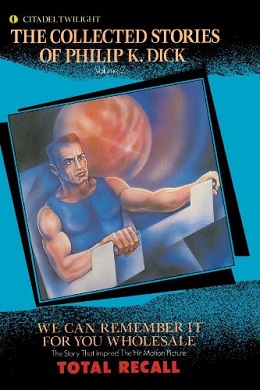
We Can Remember It for You Wholesale is a collection of science fiction stories by American writer Philip K. Dick. It was first published by Citadel Twilight in 1990 and reprints Volume II of The Collected Stories of Philip K. Dick replacing the story "Second Variety" with "We Can Remember It for You Wholesale". Many of the stories had originally appeared in the magazines Fantasy Fiction, Fantastic Universe, Fantasy and Science Fiction, Imagination, If, Amazing Stories, Science Fiction Quarterly, Startling Stories, Cosmos, Orbit, Astounding, and Planet Stories.
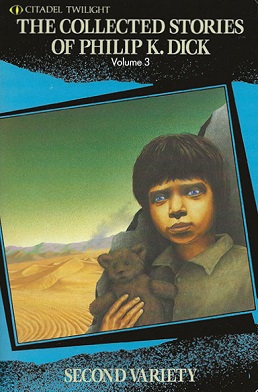
Second Variety is a collection of science fiction stories by American writer Philip K. Dick. It was first published by Citadel Twilight in 1991 and reprints Volume III of The Collected Stories of Philip K. Dick with the addition of the story "Second Variety". Many of the stories had originally appeared in the magazines If, Science Fiction Adventures, Science Fiction Stories, Orbit, Fantasy and Science Fiction, Imagination, Future, Galaxy Science Fiction, Beyond Fantasy Fiction, Satellite, Science Fiction Quarterly, Imaginative Tales and Space Science Fiction. There is huge overlap with the 1997 The Philip K. Dick Reader: stories 1–20 and 24 are identical.

The Minority Report is a re-titled collection of science fiction stories by Philip K. Dick. It was published by Gollancz and Citadel Twilight in 1991, being a reprint of Volume IV, "The Days of Perky Pat" of The Collected Stories of Philip K. Dick (1987). The collection The Days of Perky Pat was published in Britain in hardback by Gollancz in 1990 and in paperback by Grafton in 1991. The stories had originally appeared in the magazines Galaxy Science Fiction, Science Fiction Stories, If, Fantastic Universe, Fantasy and Science Fiction, Fantastic, Worlds of Tomorrow, Escapade and Amazing Stories.

The Eye of the Sibyl is a collection of science fiction stories by American writer Philip K. Dick. It was first published by Citadel Twilight in 1992 and reprints Volume V of The Collected Stories of Philip K. Dick, omitting the story "We Can Remember It for You Wholesale". Many of the stories had originally appeared in the magazines Worlds of Tomorrow, Galaxy Science Fiction, Amazing Stories, Fantasy and Science Fiction, Famous Science Fiction, Niekas, Rolling Stone College Papers, Interzone, Playboy, Omni and The Yuba City High Times.

The Philip K. Dick Reader is a collection of science fiction stories by American writer Philip K. Dick. It was first published by Citadel Twilight in 1997. Many of the stories had originally appeared in the magazines If, Science Fiction Adventures, Science Fiction Stories, Orbit, Fantasy and Science Fiction, Imagination, Future, Galaxy Science Fiction, Beyond Fantasy Fiction, Satellite, Imaginative Tales, Fantastic Universe and Space Science Fiction. It is identical in content and order to the edition of volume 3 of the Collected Stories of Philip K. Dick produced by the same publisher apart from the substitution of three stories in positions 21-23 of 24 and the omission of the end notes in the Collected Stories edition. At press time, stories 21 and 24 had already been made into successful movie adaptations and stories 22 and 23 had been optioned.
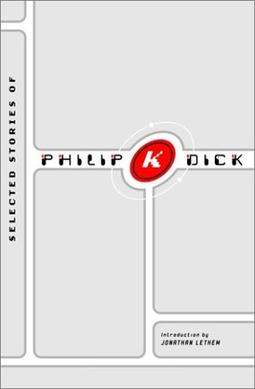
Selected Stories of Philip K. Dick is a collection of science fiction stories by Philip K. Dick. It was first published by Random House in 2002. Many of the stories had originally appeared in the magazines Planet Stories, Fantasy and Science Fiction, Imagination, Space Science Fiction, Astounding, Beyond Fantasy Fiction, Orbit, Galaxy Science Fiction, Fantastic Universe, Amazing Stories, Rolling Stone College Papers, Omni and Playboy.

Paycheck is a collection of science fiction stories by American writer Philip K. Dick. Although the collection appears with a 2003 copyright, it was first published by Gollancz in February, 2004. Many of the stories had originally appeared in the magazines Imagination, Startling Stories, Amazing Stories, Fantasy and Science Fiction and Galaxy Science Fiction.
"The Preserving Machine" is a science fiction short story by American writer Philip K. Dick. It was first published in the June 1953 issue of Magazine of Fantasy and Science Fiction, and is included in a later collection of the same name, The Preserving Machine.
"The Short Happy Life of the Brown Oxford" is a science fiction short story by American writer Philip K. Dick, first published in the January, 1954 edition of The Magazine of Fantasy & Science Fiction and later in Beyond Lies the Wub in 1984 and in The Short Happy Life of the Brown Oxford, a collection of Philip K. Dick short stories, in 1990.

"The Builder" is a science fiction short story by American writer Philip K. Dick. It was first published in the magazine Amazing Stories, in December, 1953-January 1954, with illustration by Ed Emshwiller. Dick had submitted many short stories to magazines and made approximately fifteen sales before becoming a client of the Scott Meredith Literary Agency. This was his first SMLA submission, received by SMLA on July 23, 1952. His second SMLA submission was Meddler, received by SMLA on July 24, 1952. The SMLA file card for "The Builder" shows it was submitted to mainstream magazines The Atlantic Monthly and Harper's before it was submitted to Amazing Stories and has an SMLA sub-agent's notation, "IT ISN'T SCIENCE FICTION".
